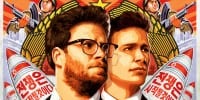 Some neocons like to argue that the protections afforded by the First Amendment really only apply to political speech — that artistic speech of a non-political nature simply isn’t subject to the same rigorous scrutiny. (Even political speech to them doesn’t include, apparently, blocking traffic or wearing T-shirts on the field at sporting events) And while no one has probably ever referred to what Seth Rogen does as art, the free expression issues raised in the controversy over his new film, The Interview, reach the level of serious discussion.
Some neocons like to argue that the protections afforded by the First Amendment really only apply to political speech — that artistic speech of a non-political nature simply isn’t subject to the same rigorous scrutiny. (Even political speech to them doesn’t include, apparently, blocking traffic or wearing T-shirts on the field at sporting events) And while no one has probably ever referred to what Seth Rogen does as art, the free expression issues raised in the controversy over his new film, The Interview, reach the level of serious discussion.
If you haven’t heard, the comedy — which was supposed to screen for local critics tonight and open in Dallas on Christmas Day — is a about the comical attempts of a talk show host and his producer to assassinate Kim Jong Un, North Korea’s dictator. Last month, pro-North Korean factions hacked the private servers of Sony (the parent company of Columbia Pictures, which is releasing the film), and disclosed all sorts of embarrassing details about the company, and threatened to blow up movie theaters who dared screen the film which dares parody the leader of the most oppressive regime in the world. In other words, to these guys, there is no such this as protection for free expression of ideas, even stupid ones. (I suppose they have that in common with a lot of folks at FoxNews — ironic, since FoxNews specializes in stupid ideas.)
Yesterday, Sony caved to pressure, and yanked the film from distribution, not even planning for a video-on-demand or DVD release at a later date. The ironic thing was, many hours after the decision had been announced, commercials for The Interview we’re still appearing on cable TV shows, promising a movie viewers would never see.
Without defending the specifics of The Interview (which I have not seen), keep in mind what this says about society: The Interview is a fantastical comedy, albeit about one real person (highly fictionalized). Comedy is key to this. But what other films actually opening on Christmas Day? A story about another real person, only it’s a true story: Louis Zamperini was brutally tortured by the Japanese during World War II (Unbroken); astonishingly, Japan has not required that the film be censored, nor have Japanese-American groups threatened terrorism for portraying their people in a negative light. Another true story is about a gay man, who also happens to be the greatest mathematician of the 20th century, who was unjustly treated by the horrific homophobia of the British system in the 1950s (The Imitation Game). To date, Queen Elizabeth has not demanded an apology. And in the Dec. 25 release American Sniper, real marksman Chris Kyle methodically uses a long-range rifle to kill a prepubescent boy in Afghanistan, then immediately turns his site on the boy’s mother and takes her out as well. (They were wielding grenades at U.S. troops.) The Islamic community so far has not declared a jihad on the studio.
Then there’s a movie in which a key plot point is a young African-American orphan is kidnapped (Annie) … a movie where a witch practicing dark arts casts spells to keep a couple barren, and people die as a result of their bad behavior — no happy endings in Into the Woods … even in The Gambler, African-Americans and Koreans are portrayed as thuggish gangsters (I guess impugning South Koreans is OK) All in all, this season at the movies is rife with controversy, downbeat themes, violence, injustice, and brutality — often at the hands of people who might otherwise be offended at the characterization. But only the comedy about a country that doesn’t even know the Internet exists is being pulled from theater.
To be fair, Sony didn’t have many options. Major theater chains had refused to show the film, citing safety concerns. But think about what this statement says on the same day the U.S. announced efforts to normalize relations with another oppressive dictatorship, Cuba. It’s a message that tyranny wins, and self-expression isn’t an absolute. The loudest voices can drown out the sensible ones. It’s sad that all this time, we were worried about North Korea having nuclear capabilities, when all they really needed was wifi.
It would appear that the neocons have been proven right: Freedom of expression may very well be dead … and not just in North Korea.














